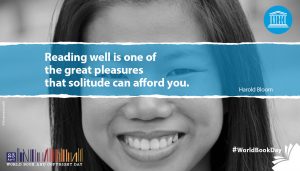To promote multilingual literacy to the members of the IFLA is like preaching to the choir. International is almost equivalent to multilingual, as each nation has its own unique linguistic characteristics. So, too, IFLA is committed to a Global Vision spanning nearly 200 countries and territories, each with its own dialect. Indeed, dialect and library and literacy are intrinsically rooted in recognition of the supreme importance of reading. Knowledge of and learning of additional languages are obviously inextricable from that priority, a focus shared across national and regional borders, and adopted as a major target by the United Nations.
Literacy in One Language is Not a Sufficient Goal
Obviously, mastering one language is a necessary first step. 40 % of the global population lacks access to education in the language they speak and understand. However, is education and mastery of one language sufficient? Many children raised by bilingual parents, who speak at least two languages from the get-go, are blessed with many advantages over their monolingual peers. But let’s consider the case of someone who grew up with one-language and now wants to learn another. Before addressing the benefits of bilingualism, it’s only natural to examine the best languages to learn. Related:https://www.tomedes.com/translator-hub/15-best-languages
To answer the question, we must consider the metrics for answering the question. One possible consideration is how many people speak that language. If we assume that English is your mother tongue, it means you already speak the most spoken language in the world. But with more than 1.2 billion English speakers – not all fluent, mind you – the proverbial cup is still mostly empty. More than 5 out of 6 people in the world can’t understand you, and you can’t understand them.
It’s also important to bear in mind that most of those English speakers speak it as a second language, not a first. Coming in a close second place in overall speakers is Mandarin Chinese, followed by Hindi. The next question to ask is why you would want to learn a specific language. Do you have an interest in China or India? Do you have a professional reason for learning them? Relatives there? A love interest? If the answer to all these questions is no, forget them! They are both demanding and difficult languages to learn.
If usefulness is a key criterion in deciding which language to learn, then two candidates naturally high on your list. One will be Spanish – the second most popular native tongue and the main language of Latin America and the fastest growing language in the United States. Another will be French, the third most popular second language, this badge of honor attributable to France’s colonial legacy in Africa and the Americas. Knowing Spanish or French will be most useful if you are traveling on these continents or interest in interacting with members of their substantial diasporas. But ultimately, the decision comes down to where you want to travel and live, and who and which cultures you want to get to know.
The Benefit of Literacy in Multiple Languages
Studies show beyond doubt that bilingualism and biliteracy have many benefits for children: cognitive ability, learning and school readiness, social development, and capacity for success in life. Biliterate Individuals learn to switch frequently and rapidly between two distinct language systems. That makes their brains more active and more adaptable. Compared to monolingual peers, bilinguals understand math concepts more easily, solve problems faster, cultivate stronger thinking and logical skills, focus better, remember more, and make better decisions. They also are better at learning additional languages.
Social and emotional development is also improved because bilingual kids keep stronger ties with their families, cultures, and communities, strengthening identity and feeling of self-worth. They make new friends more easily. Babies raised bilingually demonstrate superior self-control, a key predictor of school success. Bilingual ability promotes abstract thinking, a learning key. Research indicates that bilinguals are more focused and capable of blocking irrelevant information. Globally, bilingual adults have broader job opportunities than their monolingual counterparts. They are better equipped to participate in the global community, obtain information from more diverse sources, and learn more about other cultures.
Learning New Languages Has Never Been Easier
With all of the benefits of learning and using additional languages, it should come as no surprise that huge sums are being invested in language learning services. The global language services industry, which focuses on translation and localization of digital content, is expected to top $50 billion annually this year, growing more than 6% annually. All of the largest technology providers – Facebook, Amazon, Microsoft, Google, and Apple — consider machine translation to be an important investment.
The result is that anyone with a smartphone – and by now that’s more than half of people over 10, with more than 3.5 billion users worldwide – possesses powerful language learning tools in their palms of their hands. Two of the most common apps for translation, Google Translate, and Microsoft Translator allow foreign languages to be translated and vocalized instantly. Apps also can conduct conversations in any language with virtual voice
assistance, or to use Siri or Alexa to translate for you. Not all languages are supported invoices, but the number grows each year.
For those who seek structured language learning programs, they abound on the internet. Programs like Babbel and Rosetta Stone promise basic literacy and speaking ability within weeks. The best-known and most successful free language learning app is DuoLingo, with more than 100 million users. Hello, Talk takes a different approach, connecting you with native speakers, an approach that brings a social benefit of interlingual and international connections.
In the coming decade, multilingual literacy will be pushed strongly. Those who promote multilingual literature have powerful allies. UNESCO, the United Nations Educational, Social, and Cultural Organization, has taken a lead role in facilitating and encourage lifelong learning and multilingual literacy throughout the world. This campaign is integrated with the broader 2030 Agenda for Sustainable Development, including its literacy target (4.6) which focuses on support for multicultural communication. So if the 177 signatories to Agenda 21 have their way, many more of us will be speaking more languages and, we hope, understanding each other a little better. As we seek to conserve the world’s resources, it would be a waste and a shame if what we say gets lost in translation.
Ofer Tirosh is the founder and CEO of Tomedes, a professional language services agency focusing on translation, interpretation, and localization, supporting over 100 languages.

